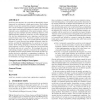1806 search results - page 340 / 362 » Programming Cognitive Agents |
152
Voted
ATAL
2005
Springer
15 years 8 months ago
2005
Springer
Reinforcement learning problems are commonly tackled with temporal difference methods, which use dynamic programming and statistical sampling to estimate the long-term value of ta...
122
Voted
IFIP
2004
Springer
15 years 8 months ago
2004
Springer
Previous type systems for mobility calculi (the original Mobile Ambients, its variants and descendants, e.g., Boxed Ambients and Safe Ambients, and other related systems) offer lit...
118
Voted
ESAW
2000
Springer
15 years 6 months ago
2000
Springer
While software is becoming decomposed in more and more finegrained entities, the interactions amongst those become of major importance. While methodologies for building such compon...
145
click to vote
ATAL
2008
Springer
15 years 4 months ago
2008
Springer
In repeated games with incomplete information, rational agents must carefully weigh the tradeoffs of advantageously exploiting their information to achieve a short-term gain versu...
149
Voted
ATAL
2010
Springer
15 years 3 months ago
2010
Springer
Social laws have proved to be a powerful and theoretically elegant framework for coordination in multi-agent systems. Most existing models of social laws assume that a designer is...



